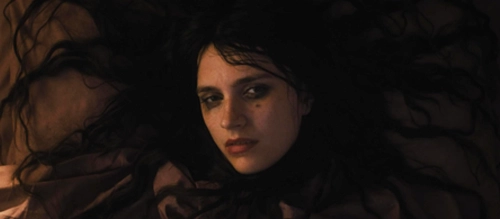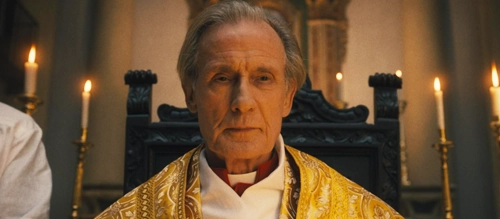
The First Omen (2024)
Director: Arkasha Stevenson
Screenwriters: Tim Smith, Arkasha Stevenson, Keith Thomas
Starring: Nell Tiger Free, Tawfeek Barhom, Sônia Braga, Ralph Ineson, Bill Nighy
It seems that there is something in the air. We are in a new era of Nunsploitation or, perhaps more specifically, Catholic-sploitation. In the past few years we’ve had films such as Prey for the Devil (2022), The Pope’s Exorcist (2023), and The Exorcist: Believer (2023); even before that, the nunsploitation subgenre got restarted thanks to James Wan and Leigh Whannell getting The Nun (2018) to do the rounds in the Conjuring franchise. Of more relevance, however, is Immaculate, a film which came out only two weeks ago. It is this film which is of interest because, for all intents and purposes, it is exactly the same film as The First Omen.
Take a drink if you’ve heard this one before…
A young American woman, conservative in values, having found God, travels to Italy to take her vows and live out in a convent. She makes some friends with other young initiates, and angers one or two of the long-term residents. Some of the order don’t seem to be on the right side of things and might be hiding secrets in locked compartments of their inner chambers. Our heroine has visions and hallucinations. One of the nuns commits suicide in the main plaza section of the convent. There’s an attempted escape that doesn’t work out. There’s a plotline stolen from Ira Levin’s novel “Rosemary’s Baby”, ironic as that book’s 1968 film adaptation is part of the unholy trinity of Hollywood Satanism films, along with 1973’s The Exorcist and, would you believe it, the original 1976 The Omen film.
Whoever went to see Immaculate two weeks ago will recognise this film. Had they been released a year apart, there would have been serious lawsuits levelled at The First Omen for how similar it is. The other incredible part of the situation is how similar the productions are in regard to attempts, and failures, to override convention. When M3GAN was released last year, it was a prime example of a film trying everything it could to do better than the Hollywood codes and conventions allowed it to. It was a new beast straining at the leash to change up tropes that the powers that be told it to have. Immaculate followed in a similar path, with a crew (especially a director) trying everything to make the film far better than the script allowed it to be.
Arkasha Stevenson’s direction in The First Omen (in her feature film debut, no less) is illustrative of her earnestly wanting to make the film unusual. She desperately tries to add in longer takes, more surreal imagery, trance-like moments. She attempts to give the film an ethereal, hallucinogenic quality, before a hideous dropping of the veil for the finale. Editors Bob Murawski and Amy E. Duddleston, to their credit, mostly give her the room to try out these ideas instead of cutting it to shreds, although the film has an annoying habit of Mark Korven’s score swelling before cutting to the next scene, chopping off the music as it does. The cast do their best, with stalwarts Ralph Ineson (The Witch) and Bill Nighy (Living) performing admirably. Nighy especially brings a gentleness and kindliness to the role of Cardinal Lawrence, while lead Nell Tiger Free does all she can to anchor the film, giving a great blend of innocence and trauma, to her credit.

The issue is that it’s an Omen prequel. We know what has to happen, and it isn’t a shock that it does, so the ending is out. 20th Century Studios, by making a prequel to one of the best-known horror franchises of all time, has to ensure they deliver at the box office, and so task their writers with hitting all the beats they know are in circulation. To deviate from them with a $30m budget on the line would be far too big a risk. It might tank other possible films, which considering the last Omen film was the remake nearly two decades ago, means that this film is essentially a backdoor reboot (the ending certainly leaves it open so that, should the box office be good enough, we can expect another two films upcoming soon).
It’s so by-the-numbers in dullness that it makes none of the film intellectually stimulating in the slightest. You can see the crew crying behind the cameras, trying with all their might to inject any semblance of personality into the film, but they are held back at every opportunity. Even worse, because it came out two weeks after Immaculate, it’s going to get mixed up with that film for the rest of time. In six months you won’t be able to remember which character, moment, or visual, is from each film.
Does that make The First Omen a bad film? Somehow, no. There are just enough gaps between its cinematic jail cell bars to see that there’s a half decent picture trapped inside. There are glimmers, there are moments, and if it wasn’t called “Omen” they would have given it more free reign (and half the budget), and it might have even been something a little unique. Rose Glass’s 2019 film Saint Maud showed what could be done with this kind of idea.
With a backdoor reboot, the producers needed to let The First Omen do something different, to change up the franchise for something new, fresh, and inventive. To be fair to the filmmakers, when the script turns its back and the producers go to collect another bonus, the film eagerly sprints for the door to originality. But a major Hollywood studio was never going to allow this for a major franchise film, was it?
Score: 14/24

